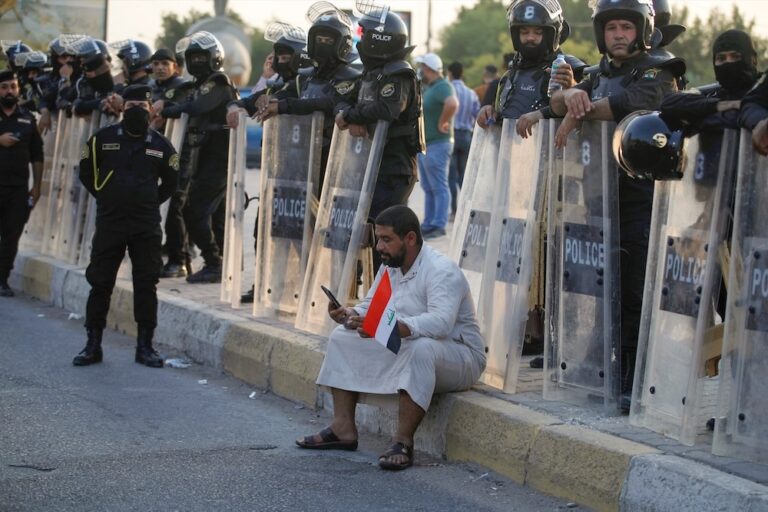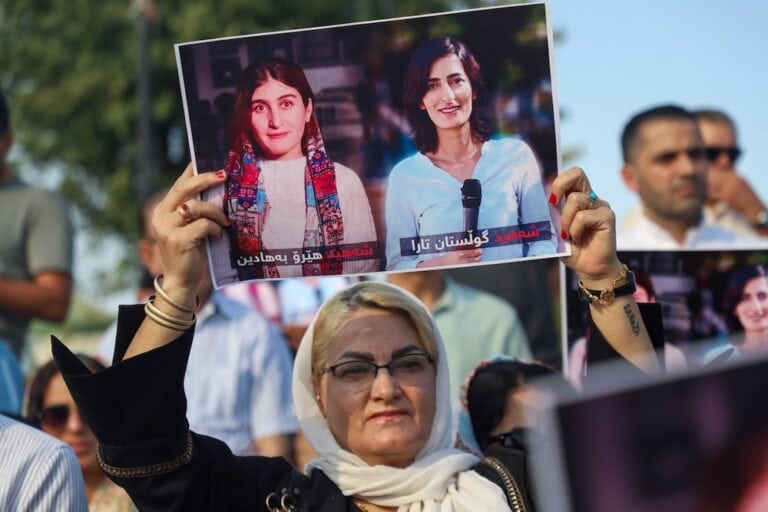On 25 January 2013, violence erupted during a sit-in in Fallujah, one of many sites of regular demonstrations in Anbar province. Demonstrators and army troops clashed when protesters threw stones at soldiers as they made their way to the sit-in. Soldiers fired live rounds, killing seven people, according to these accounts. Another two people who were wounded in the shootings died later from their injuries.
(Human Rights Watch/IFEX) – According to witnesses who spoke with Human Rights Watch, shortly after noon on January 25, about 10 soldiers at an army checkpoint prevented people from reaching a sit-in site. A Fallujah resident who attended the January 25 sit-in, who asked to be identified only as Abu Rimas, said that the soldiers verbally provoked a group of demonstrators as they were walking near the highway toward the sit-in. Abu Rimas said the demonstrators numbered in the hundreds:
The demonstrators were walking past the checkpoints, at a distance, and the soldiers started yelling at us. They said, “Why are you coming here to demand the release of the whores [referring to female detainees] and terrorists? You are terrorists.” This provoked the demonstrators and many of them started throwing rocks at the army, and [the army] opened fire. Some of them opened fire right away, into the air . . . but some of the soldiers fired into the crowd.
He said the demonstrators were close enough to hear the soldiers yelling, but far enough away that none of the thrown rocks reached the checkpoint.
“The army used too much force,” he said. “The demonstrators were far away from them, so I think they could have just stood where they were, and the rocks would not have hit them.”
A 22-year-old demonstrator who said he witnessed the shooting, Adnan Jabouri, told Human Rights Watch: “Many people were shouting at the army. Some of the people destroyed a car, but were not hurting anybody. Without warning, thousands of shots were fired. Everyone was running. I saw a man being carried who had blood on his face and his shirt. Why did they do this?”
An Iraqi soldier who was stationed in Fallujah the day of the shootings denied protesters’ contentions that the situation became tense when the army prevented a group of them from reaching the protest site. The soldier, who requested anonymity because he is not authorized to speak publicly, told Human Rights Watch that a group of demonstrators began throwing rocks at an army checkpoint and “destroyed a military car.” He said that the army withdrew to another position to avoid the demonstrators’ stones. But he said that soldiers became angry when they heard a report that an attack elsewhere had killed three soldiers in Fallujah earlier in the day and retaliated by firing in the air to disperse protesters, unintentionally hitting some of them.
The staff member at the Fallujah hospital who spoke to Human Rights Watch described the scene in the hospital that day. The employee, who requested anonymity, said he was called into work after the shootings, although it was his day off, because of the large numbers of casualties.
“We had eight operating rooms, and all were occupied for several hours,” he told Human Rights Watch. “When I reported for duty, seven people were already dead, and another two died the day after. There were 38 people injured. All of them had sustained a gunshot,” he said. “I thought that many of them would have fallen or been trampled by the crowd, but every one of them had been shot.”
Since the start of recent protests at the end of 2012, in response to demonstrators’ complaints of mistreatment of the Sunni minority at the hands of authorities, al-Shahristani has vowed to end the government’s use of secret informants to detain suspects. He announced the release of 3,000 detainees and convicted prisoners and promised to review the files of all detainees and release suspects who had not been convicted of a crime.
Protesters also demanded that prisoners be held in facilities in their own provinces, and that the government amend Iraq’s anti-terror law, which gives security forces sweeping authority to arrest suspects. Though the government has announced its intention to undertake reforms, it has not made clear how it will address the systemic problems underlying the criminal justice system that violate international law, such as arbitrary arrests and detentions and mistreatment of prisoners. The government has not stated whether a judicial authority had reviewed the detention of the detainees who were released, as required by international law, highlighting the opacity of Iraq’s criminal justice system.


